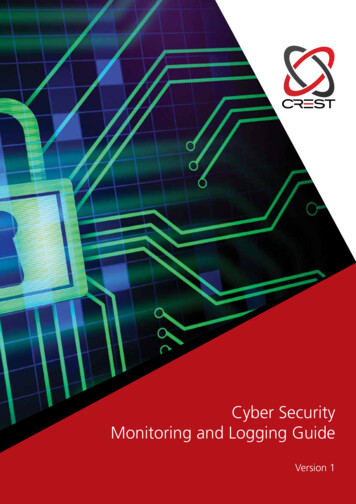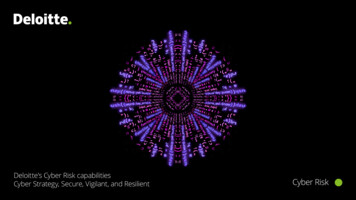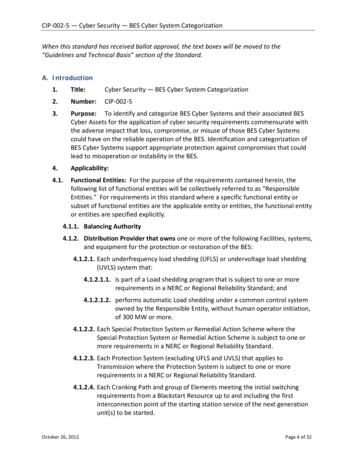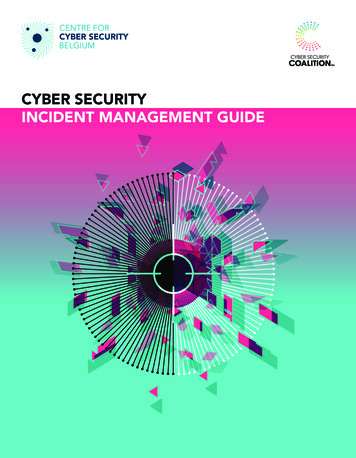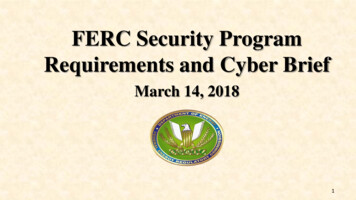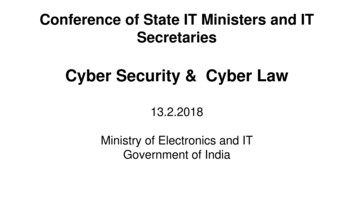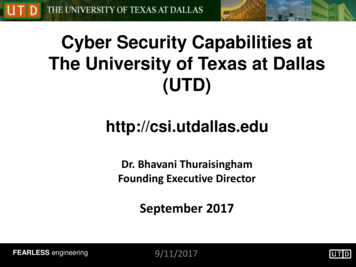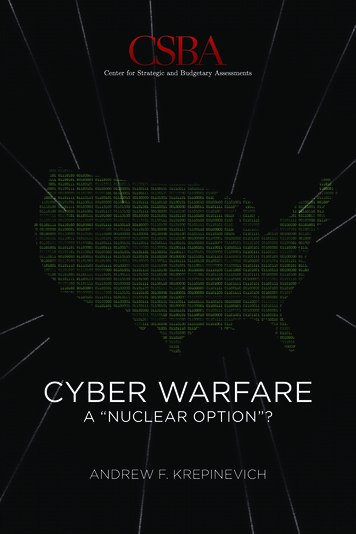
Transcription
UNCLASSIFIEDCYBER SECURITY CAREER GUIDEStart your career Develop new skillsIN THIS GUIDE} WHAT IS CYBER SECURITY?Learn how cyber securityaffects your everyday life andwhy more professionals are needed.} TYPES OF CAREERSLearn about the different roles you can play.} WHO IS HIRING?Find out where your career can take you.} CAREER PATHWAYSSee how the path you choose leads to different careeroptions.} WHERE TO GO TO SCHOOLFind out where you can get the education you need tostart your career or develop new skills.} WORKING AT CANADA’S NATIONAL CRYPTOLOGICAGENCYFind out why a career at the Communications SecurityEstablishment (CSE) may be right for you.
WHAT IS CYBER SECURITY?Many teams worked together to create this guide from thecomfort of their homes. Amid a worldwide pandemic, wemanaged to keep working. To create. To move forward. Tocommunicate.But the COVID-19 pandemic did not bring out the best ineveryone. There were unscrupulous people trying to takeadvantage of Canadian citizens. Our healthcare systems weretargeted. Criminals were looking for Canadians’ names, SINs,addresses, birth dates, and banking and credit card information.Criminals tried to trick Canadians into clicking on links thatwould take them to malicious websites. The links were sentvia text messages, emails, and social media apps. Once on thewebsite, malicious code would start downloading onto devicesto steal personal information.Hi, my name is Christine Beauchamp, and Iam the Director of Client Engagement andIncident Detection at the Canadian Centrefor Cyber Security (within CSE).When I graduated from the Universityof Ottawa with a degree in Sociologyto combine with my degree in Russiantranslation, I did not see myself workingin cyber security. But, just as quickly astechnology advances, career options andeducational pathways grow.In the following pages, you will findinformation on the cyber security field andthe many educational paths that can leadyou to your dream job. I hope this guidehelps you find the path that best suits yourinterests—one that makes you want to getout of bed in the morning.Stop for a minute to think about all the things you do on yourphone, tablet, or laptop. Do you do your banking online? Doyou have a mobile wallet? Do you chat on social media or sendpictures to friends? Do you have your assignments storedthere?Wouldn’t it be nice if you could go online and not worry aboutcriminals trying to steal your money or identity?That is what cyber security is. It is the constant pursuitto secure our information systems, the data on them,and the services they provide. It is about protecting thesystems that all Canadians rely on like healthcare, banking,telecommunications, energy, and transportation. It is aboutprotecting businesses big or small.Cyber security is about securing our future.Whichever stream you choose, you will bemaking a difference by helping strengthenCanada’s digital safety and security.Whether you write code, set up equipment,design infrastructures, or train the nextgeneration, you are helping to secure ourfuture.Good luck! I can’t wait to see where yourpath takes you.2
CYBER SECURITY PROFESSIONALSARE MARKWOOFFIN DEMANDThe number of jobs for cybersecurity professionals in Canada7%the3.5Million:number of vacant positionsis growing by“When you work at CSE, every day is anopportunity to make a difference in theworld of cyber security.”every year!1worldwide by 2021.2AYESHASIDDIQUIWELL PAIDThe annual average salary of acyber security professional in2020 is 97,000.“At CSE, you will find yourself surroundedby a group of brilliant, dedicated, andconsiderate experts who work towards acommon goal. Explore the phenomenalopportunities and build a career you’ll beproud to call yours!”3DIVERSITY REQUIREDToday’s cyber security professionalsknow that the best solutions come fromdiverse teams. Having people of differentbackgrounds and experiences workingtogether on a problem creates the best,most effective solutions.ANGELAMCALLISTERDiversity provides access to a greaterrange of talent. It provides greaterinsight into clients’ needs. It helps opendoors to new markets and helps make acompany more profitable and resilient.“My work is meaningful and helps protectCanada. I love knowing that I’m making apositive contribution to Canada’s future.”Cyber security is for everyone!3
CYBER SECURITY PROFESSIONALS PROTECT THE SYSTEMS WE RELY ONIn the last 20 years, advancements in technology have changed the way people communicate, bank, shop, and passthe time. And, despite its small market size, Canada was the third most targeted country to possible cyber attacks in2018. The growing threat of cyber attacks has made governments and industries more aware of the need to protectand defend the information and systems Canadians rely on. As a result, cyber security is growing as a recognizablediscipline that encompasses multiple specialities in science, mathematics, business, social sciences, and computingand engineering faculties.Although only a subset of businesses participates directly by producing or selling cyber security solutions or bybuilding or operating networks, every business uses technology to deliver its products and/or services securely andefficiently to consumers. Cyber security, as a result, has become more important to protect the computer systems ofall businesses in all industries.FINANCE AND BANKINGGOVERNMENTThe industry maintains valuableinformation such as client identities,bank account information, financialassets, and intellectual property.Cyber attacks on governments areincreasing daily because a successfulattack provides access to large amountsof private and sensitive information.HEALTHCOMMUNICATIONSSystems hold sensitive patientinformation and encompass medicalimplant devices such as pacemakersthat may be exploitable.The industry transmits a large amountof sensitive information such as onlineretail transactions, email messages,web-browsing activity, social mediaplatforms, and user’s private information.TRANSPORTATIONENERGY AND UTILITIESAn industry vulnerable to cyber attacksto air and ground transportationsystems. As well, the industry holdssensitive and valuable information suchas birth dates, and passport numbers.An ideal target for cyber attacks onindustrial control systems to accessdata or to cause physical damage toinfrastructures.SAFETYEmergency response teams,law enforcement, call-centercommunications-management software,CCTV systems, interactive voiceresponse systems, and emergency alertsystems are all vulnerable to attack.4
WHO IS HIRING?Everyone!That may be an exaggeration, but it is not far from the truth. Businesses of all kinds have proprietary information theyneed to protect. They also have the personal information of their employees, clients, suppliers, and business partnersto protect.Every online retailer, bank, school, law firm, medical facility, utility, government has information and systems thatneed protection. Companies that engineer systems or new technologies, or companies that perform design work haveintellectual property that needs to be protected.Basically, if a business uses the internet or a network to perform its tasks, it needs cyber security professionals!Cyber security is fundamental to good business.Private sector companies and government agencies both offer exciting career opportunities. Plus, the skills andexperience acquired in either sector are attractive to both types of employers. So, mobility from one to another isalways an option. The facts below highlight why cyber security professionals are in high demand.Any device that is connected to the internet is vulnerableto cyber attacks.Worldwide, there will be 38.6 billion devices internet-connecteddevices by 2025.4Cyber attacks happen every 39 seconds.5WHAT DO CYBER SECURITY PROFESSIONALS DO?Cyber security professionals work in diverse fields andperform important roles, such as:The great part about cyber security is that itencompasses many different fields. Yes, there are theextremely technical roles. But there are also manydifferent fields that contribute to a business’s securityposture (how good their cyber defences are).} Defending our nation} Securing our telecommunications infrastructure} Safeguarding our moneyAs today’s companies do more of their business online,the need for cyber security professionals continues togrow.} Protecting our electrical distribution systems} Protecting our identities} Ensuring our medical information remains privateJob roles can be separated into four basic categories.Let your interests guide you when choosing a careerpath.} Stopping ransomware attacks} And many more5
1. GOVERN AND SUPPORTNO EXPERIENCE? NO PROBLEM.Manage and provide direction andsupport to ensure an organizationconducts effective cyber securitywork. Roles include cyber legaladvisor, policy analyst, privacyofficer, and risk analyst.So, you’ve decided to make the jump and enroll in acyber security program. Now what, you ask? “Will I beable to find a job in the field after school if I have nowork experience in cyber security?”The odds are in your favour. Consider this: graduatesof cyber security programs tend to be quicklyrecruited by public and private sector organizations.In fact, the shortage of cyber security professionalsis so pronounced that organizations are retrainingemployees in basic cyber security skills on the job! Asa skilled graduate of a cyber security program, you aresure to be an attractive candidate for many employers.2. PROTECT AND DEFENDDetect, prevent, respond to, andrecover from cyber incidents andthreats. Roles include cyber threatassessor, data scientist/modeler, bigdata analyst, cyber security analyst,information security analyst,vulnerability assessment analyst,and penetration tester.To increase your odds, do the following:NETWORKGet a LinkedIn account and start connecting withpeople in the industry. Businesses post jobs there andrecruiters use it as a tool to find candidates.3. DESIGN AND DEVELOPDevelop, secure, test, and integratehardware, software, and systemsthroughout a product’s life cycle.Roles include security architect,security engineer, applicationdeveloper, and secure softwaredeveloper.UNDERSTAND THE BASICS OF ITUnderstanding the fundamentals of IT, such asadministering & configuring systems, networks,database management and coding will go a long waytowards getting your first job.4. OPERATE AND MAINTAINFOCUS YOUR INTERESTSAdminister, maintain, and supportto ensure effective and efficientperformance and cyber security.Roles include network securityoperator, cryptanalyst, and technicalsupport specialist.It is impossible to be an expert in all categories. Focuson an area (e.g. networking security) and understandit well. Think ahead 5-10 years to your dream job, thenlook for an entry-level position that will give you theright skills.GAIN PRACTICAL EXPERIENCEGain as much hands-on experience as possible. A coop position or internship will help you get a sense of ITprocedures and real-world business operations. Evenif you’re not in a program that offers these types ofpositions, you can accomplish a lot with self-directedlearning. Many universities or certification authoritiesoffer free online resources.6
CYBER SECURITY PROFESSIONALS COME FROM ALL PROGRAMSOrganizations of all kinds face a formidable task when it comes to protecting their networks and the importantinformation those networks store, process, or transmit. Surprisingly, the responsibility of protecting those networksdoes not rest solely on the shoulders of the highly technical staff who design, operate, and maintain the networks.EVERY EMPLOYEE HAS A ROLE TO PLAY!Employees need to behave in a safe and cyber-secure manner. To do so, they must be trained. Therefore, learning andteaching professionals are required to develop and deliver courses. But, what does “safe and secure manner” reallymean? Perhaps a policy analyst or a communication expert can help define the needs of the organization.Organizations must also ensure they are compliant with the growing list of laws and standards. This points to a needfor lawyers and policy makers who understand the implications of cyber security on day-to-day operations. To hirethe people with the appropriate skills, human resources professionals must know what certifications and experienceto look for.Similarly, effectively enforcing cyber security policies requires coordination between groups within an organization.This requires the ability to work with diverse groups to define technical measures that have the right balance betweensecurity and usability.To remain cyber secure, businesses need staff that have knowledge beyond that of just computers. There is a needfor cyber security professionals who specialize in business, law, criminal justice, risk management, statistics, humanresources, social and political science, and many other disciplines. Even knowing a foreign language can help get ajob in cyber intelligence.BOTTOM LINEYou don’t need to be highly technical or understand the inner workings of a computer to work in cyber security.However, you do need to understand the basics of the cyber security eco-system. Many universities and collegesoffer introductory cyber security courses; take one as an elective to see if working in this field interests you. If so, trytaking more advanced courses or getting an entry-level security certification. Your institute may even offer courses toprepare you for certification exams.7
PATHWAYS TO SUCCESSGET ACERTIFICATIONEntry-Level Positions} IT Support Specialist} Computer Network SupportSpecialist} Junior Cyber Security AnalystGET A COLLEGE DIPLOMA ORGRADUATE CERTIFICATEGET A BACHELOR’SOR GRADUATE DEGREEEntry-Level PositionsEntry-Level Positions} Network Support Specialist} IT Security Specialist} Network Security Operator} Security Tester} System Administrator} Incident Responder} Security Administrator} Cyber Security OperationsAnalyst} Cyber Security OperationsAnalyst} Vulnerability AnalystA certification is a goodway to kick start yourcareer.To advance into moresenior positions, mostemployers require abachelor’s degree orextensive experience.With Work ExperienceWith Work Experience} Penetration Tester} Cyber Security Researcher} Vulnerability Analyst} Cyber Security Engineer} Cyber Security Specialist} Cyber Security Architect} IT Support Specialist} Digital Forensic Analyst} Technical Support Specialist} Information SystemsSecurity Manager} Cyber Security Supervisor} Cyber Security Manager8
CERTIFICATIONS EMPLOYERS VALUECertifications are a great way to kick start your career as they are focused on ensuring you have the skills requiredto do the job. Make sure to figure out which one will be best for your chosen career path. Below is a list of thecertifications valued by Canadian employers. Certifications can be earned through self-study or in class. Somecertification classes and exams are offered through multiple vendors and some college programs will prepare you towrite a certification exam.*Cyber Security FundamentalsCyber Security Nexus PractitionerGIAC Security EssentialsOffensive Security Certified ProfessionalCompTIA Security GIAC Information Security ProfessionalCompTIA Advanced Security PractitionerGIAC Security Leadership CertificationCertified Information Systems Security ProfessionalGIAC Information Security FundamentalsCertified Information Security ManagerGIAC Certified Perimeter Protection AnalystCertified in Risk and Information Systems ControlGIAC Certified Intrusion AnalystSystems Security Certified PractitionerGIAC Certified Incident HandlerCertified Chief Information Security OfficerGIAC Certified UNIX Security AdministratorCyberSec First ResponderGIAC Certified Windows Security AdministratorCertified Secure Computer UserGIAC Certified Enterprise DefenderCertified Secure Software Lifecycle ProfessionalGIAC Certified Web Application Penetration TesterCertified Wireless Security ProfessionalGIAC Assessing Wireless NetworksCertNexus CyberSAFE Global Industrial Cybersecurity ProfessionalCertified Ethical HackerGIAC Critical Controls CertificationCertified Information Systems AuditorGIAC Penetration TesterCertified Cloud Security ProfessionalGIAC Security Expert9
UNIVERSITIES WITH CYBER SECURITY PROGRAMSJust as quickly as technology advances, career options and educational disciplines grow. Every year new programsare created. If you don’t see your preferred institution on this list, be sure to check its website for new programs.*ALBERTAAthabasca UniversityGraduate Certificate in Information Security (PBC-IS)Concordia University of EdmontonGraduate Diploma in Information AssuranceGraduate Diploma in Information SecurityMaster of Information Systems Assurance ManagementMaster of Information Systems Security ManagementMount Royal UniversityCertificate in Cyber Security FundamentalsAdvanced Cyber SecurityThe King’s UniversityComputer Science – Cyber Security StreamUniversity of AlbertaCertificate in Information Access and Protection of PrivacyUniversity of CalgaryBachelor of Computer Science (Security Concentration Option)Graduate Certificate in Network SecurityGraduate Certificate in Software SecurityBRITISH COLUMBIAUniversity of VictoriaMaster of Engineering in Telecommunications and Information Security(MTIS)MANITOBAUniversity of WinnipegCertificate in Information Assurance and Security CertificateDiploma in Network Security DiplomaNEW BRUNSWICKEastern CollegeDiploma in Advanced Systems Management and Cyber SecurityOulton CollegeDiploma in System Management and Cyber SecurityUniversity of New BrunswickBachelor of Computer Science (Cybersecurity specialization)Master of Cyber SecurityUniversité de MonctonCertificat en gestion de la sécurité de l'information des entreprisesNEWFOUNDLAND AND LABRADORCollege of the North AtlanticAdvanced Diploma in Cyber Security - Infrastructure10
ONTARIOCarleton UniversityGraduate Diploma in Infrastructure Protection and International SecurityMaster of Infrastructure Protection and International SecurityBachelor of Computer and Internet SecurityNortheastern UniversityMaster of Science in CybersecurityQueen’s UniversityNSERC CREATE Cyber SecurityRyerson UniversityCertificate in Computer Security and Digital ForensicsMBA in Management of Technology and Innovation, Data Security andPrivacy SpecializationUniversity of GuelphCertificate in Information Management, Privacy, and AccessMaster of Cybersecurity Threat IntelligenceUniversity of Ontario Institute ofTechnologyBachelor of Information Technology BridgeBachelor of Information Technology Networking and InformationTechnology SecurityMaster of Information Technology SecurityUniversity of WaterlooGraduate Diploma in Computer Networking and SecurityUniversity of TorontoBachelor of Computer Science Specialist Program in Information SecurityCertificate in Cyber Security ManagementMaster of Engineering in Communications with focus on Identity, Privacyand SecurityMaster of Information, with a Specialization in Identity, Privacy and SecurityYork UniversityCertificate in Advanced Cyber SecurityCertificate in Cyber SecurityCertificate in Cyber Security FundamentalsBachelor of Computer SecurityLLM in Privacy and Cybersecurity LawQUÉBECConcordia UniversityMaster of Applied Science (MASc) in Information Systems SecurityMaster of Engineering (MEng) in Information Systems SecurityUniversité de SherbrookeDiplôme d’études supérieures spécialisées de 2e cycle en gouvernance,audit et sécurité des technologies de l’informationMicroprogramme de 2e cycle en gouvernance, audit et sécurité destechnologies de l’informationMaîtrise en administration, concentration gouvernance, audit et sécuritédes technologies11
COLLEGES WITH CYBER SECURITY PROGRAMSJust as quickly as technology advances, career options and educational disciplines grow. Every year new programsare created. If you don’t see your preferred institution on this list, be sure to check its website for new programs.*ALBERTAAllison CollegeDiploma in Information Technology and Cyber SecurityBow Valley CollegeCertificate in CybersecurityCDI CollegeCertificate in Cyber Security SpecialistNorthern Alberta Institute ofTechnologyCertificate in Core Security Certificate in Enterprise SecurityCertificate in System SecurityRobertson CollegeDiploma in Network Security TechnicianSouthern Alberta Institute ofTechnologyCertificate in Cyber Security for Control SystemsCertificate in Information Security AnalystCertificate in Information Systems SecurityCertificate in IT Security Certificate of AchievementQCT CollegeDiploma in Cyber Security SpecialistBRITISH COLUMBIABritish Columbia Institute ofTechnologyCertificate in Forensic Investigation - Digital Forensics and CybersecurityOptionCertificate in Network Administration and Security Professional (NASP)Diploma in Industrial Network CybersecurityBachelor of Computer Systems - Network Security AdministrationBachelor of Computer Systems - Network Security ApplicationsDevelopmentBachelor of Forensic Investigation - Digital Forensics and CybersecurityBachelor of Computer Systems, Network Security ApplicationsDevelopmentOkanagan CollegeCertificate in BlockchainMANITOBAManitoba Institute of Trades andTechnologyDiploma in Network SecurityDiploma in Cyber Defence and Cloud AdministrationRed River CollegeDiploma in Post-graduate diploma in Information Security12
NEW BRUNSWICKNew Brunswick Community CollegePost-graduate Diploma in Information Technology: CybersecurityDiplôme en Réseautique et sécurité InformatiqueDiplôme en CybersécuritéMaster of Cyber SecurityNOVA SCOTIANova Scotia Community CollegeDiploma in Cyber SecurityDiploma in IT Systems Management and SecurityONTARIOAlgonquin CollegeDiploma in Computer Systems Technology - SecurityCentennial CollegeCertificate in CybersecurityCollège La CitéDiplôme en Technologie de l'information - Sécurité informatiqueConestoga CollegeCertificate in Network Security InvestigationsCertificate in Cyber SecurityCertificate in Computer Application SecurityCertificate in Information Technology Network SecurityDurham CollegeCertificate in Information Systems Security – Computers and NetworkingFanshawe CollegeDiploma in Cyber SecurityCertificate in Information Security ManagementCertificate in Network and Security ArchitectureFleming CollegeDiploma in Computer Security and InvestigationsGeorge Brown CollegeCertificate in Network Security Fundamentals CertificateCertificate in Information Security Management CertificateCertificate in Network and System Security AnalysisGeorgian CollegeCertificate in Information Systems SecurityHumber CollegeCertificate in Cyber Crime SpecialistLambton CollegeCertificate in Cyber Security and Computer ForensicsCertificate in Cyber SecurityCertificate in Cyber Infrastructure SpecialistLoyalist CollegeCertificate in Cyber SecurityMohawk CollegeDiploma in Computer Systems Technology - Network Engineering andSecurity AnalystCertificate in Cyber Security Analytics13
Sault CollegeCertificate in Network Architecture and Security AnalyticsCertificate in Cyber Security – Canadian ContextSeneca CollegeBachelor of Informatics and SecurityCertificate in Cyber SecurityCertificate in Cyber Security and Threat ManagementSheridan CollegeBachelor of Applied Information Sciences (Information Systems Security)Certificate in Cybersecurity - Legal and Ethical Policies and ProceduresCertificate in Cybersecurity FoundationsWillis CollegeDiploma in Cyber Security AnalystQUEBECCollège AhuntsicAttestation d’études collégiales (AEC) - Réseautique et sécuritéinformatiqueDiplôme d’études collégiales (DEC) - Techniques de l’informatique - Profilréseaux et sécuritéCégep de l'OutaouaisDEC en Techniques de l'informatique - Programmation et sécuritéDEC en Techniques de l'informatique - Réseaux et cybersécuritéCégep de Saint-HyacintheDEC en Techniques de l’informatique - Réseaux et cybersécuritéCégep de SherbrookeAEC en Cybersécurité et sécurité intégréeCégep GarneauAEC en CyberenquêteCégep LimoilouDEC en Techniques de l'informatique - Gestion des réseauxCégep Saint-Jean-sur-RichelieuAEC d’Administration des réseaux et sécurité informatiqueCollège de Bois-de-BoulogneAEC en Sécurité informatique et réseautiqueDEC en Techniques de l'informatique - Profil infrastructures et sécuritéCollège de MaisonneuveAEC en Gestion de réseaux et sécurité des systèmesDEC en Techniques de l'informatique - Infrastructure et sécurité desréseauxCollège LaSalleDEC en Techniques de l'informatique - Gestion de réseaux et sécuritéCollège Lionel-GroulxAEC en Administration des réseaux et sécurité informatiqueCollège MontmorencyTechniques de l’informatique - Spécialisation: Réseaux et sécuritéinformatiquesCollège RosemontAEC en Microprogramme de perfectionnement en sécurité des réseauxDEC en Techniques de l'informatique - Profil réseautique: sécurité etvirtualisationHEC MontréalCertificat en analyse de la sécurité de l'information et des systèmesHeritage CollegeAEC in Microsoft Network and Security Administrator14
Institut supérieur d'informatiqueAEC in Computer Networks and SecurityAEC en réseaux informatiques et sécuritéPolytechnique MontréalCertificat en CyberenquêteCertificat en CyberfraudeCertificat en Cybersécurité des réseaux informatiquesUndergraduate microprogram in Networking and SecurityMicroprogramme de 1er cycle en CyberinvestigationMicroprogramme de 1er cycle en Réseautique et sécuritéSASKATCHEWANSaskatchewan PolytechnicPost-graduate Certificate in Cyber Security15
WORK AT CANADA’S NATIONAL CYBER CENTREThe Canadian Centre for Cyber Security (Cyber Centre) is Canada’s authority on cyber security. As part of theCommunications Security Establishment (CSE), we have been at the cyber security game for over 70 years. We aretrusted experts in cyber security with a clear and focused mandate to collaborate with government, the private sectorand academia. We are hackers, builders, creators, developers, researchers, and scientists. We live cyber securityevery day. We offer a perspective and insight that isn’t available to the same degree anywhere else in Canada. Wemake Canada a safer place to be online.A CAREER THAT MAKES A DIFFERENCECANADA-WIDE STUDENT PROGRAMCanadian networks and systems face cyber threatsevery day, and with the help of our very skilled andtalented employees (like you), CSE works to preventand eliminateAt CSE we hire students from all over Canada: lastsummer we had 209 students.To apply for a student work term, you do not needto be in a formalized co-op program. You must bea full-time student who is either registered as astudent during the work term or returning to schoolimmediately following the work term.} Cyber Criminal Activities, Identity theft, Extortion,Blackmail, Theft} Terrorists Activities, Radicalization, Recruitment,Fund Raising, Destruction} Insider Threat (Employees), Disgruntlement,Financial Gain, EspionageHOW CAN I APPLY?To become part of our team, apply online atwww.cse-cst.gc.ca/en/careers-carrieresWHY WORK AT CSE?CSE has been named one of Canada’s Top Employersfor Young People in 2017, 2018, 2019 and 2020 andwas also selected as a Top Employer in the NationalCapital Region in 2013, 2014, 2015, 2018 and 2020.Besides offering meaningful work that protectsCanada and Canadians, and the chance to work withsome of the most advanced technologies in the world,we offerCAN YOU CRACK THE CODE?Try our puzzle challenges at www.cse-cst.gc.ca/en/puzzles-enigmes or check out our Twitter account(@CSE CST) for new puzzles.} Competitive wages and benefits, including adefined benefit pension plan} Education programs to help employees completea degree or professional accreditation} Specialized in-house training programs} Telework options, which enable you to work fromanywhere in Canada} Work-life balance with flexible hours and paidvacation starting at 15 working days annually, aswell as additional personal paid days-off16
NOTES*If an institution or organization believes it has a program or certification that should be added to any the lists in thisguide, please email ps://neuvoo.ca/salary/?job 39-seconds17
CYBER SECURITY PROFESSIONALS ARE IN DEMAND The number of jobs for cyber security professionals in Canada is growing by 7% every year!1 3.5 Million: the number of vacant positions worldwide by 2021.2 WELL PAID The annual average salary of a cyber security professional in 2020 is 97,000. 3 DIVERSITY REQUI

